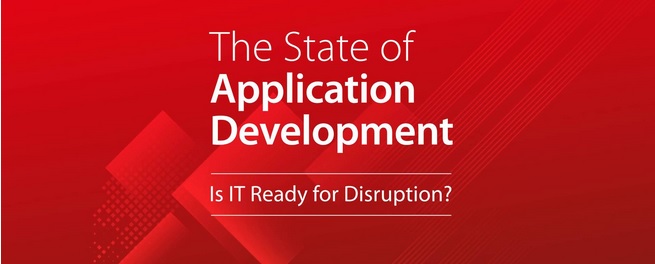Check Point® Software Technologies Ltd.(link is external) announced that U.S. News & World Report has named the company among its 2025-2026 list of Best Companies to Work For(link is external).
The number of applications slated for delivery in 2019 has increased 60%, 38% of whom plan to deliver 25 or more apps this year, according to The State of Application Development, 2019: Is IT Ready for Disruption? a report from OutSystems based on survey results from more than 3,300 IT professionals in all industries across the world.

"Our 2019 survey shows that many IT departments are facing a multitude of disruptive forces when it comes to digital transformation and application development," said Steve Rotter, CMO for OutSystems. "The threat of digital disruption and the need for digital transformation has been a driver of IT strategy for years. Add to that the current uncertain global economic outlook, and it becomes obvious why business leaders are so concerned about agility today."
"Digital transformation dominates business strategy today, which is why web and mobile development demand is booming. Moreover, speed and agility are more important than ever before", Rotter added.
More survey findings include:
Steep development time
46% of respondents said the average time to deliver a web or mobile application is five months or more.
Backlogs remain
64% of IT professionals said they have an app dev backlog, and only 39% said their app dev backlog had improved in the past year.
Development talent hard to find and keep
Most respondents have hired developers, 75% of respondents described app dev talent as scarce, and only 36% of organizations have larger app dev teams than a year ago. The numbers appear to show retention of app dev talent is an equally grave concern.
Agile practices are still slow to mature
60% of organizations have invested in agile tools and services in the past year. However, the average agile-maturity score was a lackluster 2.7 out of 5, meaning most organizations are still in the process of defining agile processes.
Customer-centricity continues to rise
Over 60% of organizations have invested in customer-centric practices in the past year, including customer journey mapping, design thinking, and lean UX. For the new apps slated for development in 2019, those that will be used directly by customers or business partners were identified as most important.
Low-Code Has Become Mainstream
Another key research finding was that low-code is no longer just for innovators and early adopters. For example, 41% of respondents said their organization was already using a low-code application platform. And, a further 10% said they were about to start using one.
The analysis in the report identified that organizations using low-code are:
■ 26% more likely to describe their organization as satisfied or somewhat satisfied with the speed of application development
■ 11% more likely to deliver web applications in four months or less
■ 15% more likely to deliver mobile applications in four months or less
■ 20% more likely to score their agile maturity as level 3, 4 or 5
■ 12% more likely to say that their app dev backlog has improved since last year
■ Reporting a 16% higher self-assessment score for digital transformation maturity
Industry News
Postman announced new capabilities that make it dramatically easier to design, test, deploy, and monitor AI agents and the APIs they rely on.
Opsera announced the expansion of its partnership with Databricks.
Postman announced Agent Mode, an AI-native assistant that delivers real productivity gains across the entire API lifecycle.
Progress Software announced the Q2 2025 release of Progress® Telerik® and Progress® Kendo UI®, the .NET and JavaScript UI libraries for modern application development.
Voltage Park announced the launch of its managed Kubernetes service.
Cobalt announced a set of powerful product enhancements within the Cobalt Offensive Security Platform aimed at helping customers scale security testing with greater clarity, automation, and control.
LambdaTest announced its partnership with Assembla, a cloud-based platform for version control and project management.
Salt Security unveiled Salt Illuminate, a platform that redefines how organizations adopt API security.
Workday announced a new unified, AI developer toolset to bring the power of Workday Illuminate directly into the hands of customer and partner developers, enabling them to easily customize and connect AI apps and agents on the Workday platform.
Pegasystems introduced Pega Agentic Process Fabric™, a service that orchestrates all AI agents and systems across an open agentic network for more reliable and accurate automation.
Fivetran announced that its Connector SDK now supports custom connectors for any data source.
Copado announced that Copado Robotic Testing is available in AWS Marketplace, a digital catalog with thousands of software listings from independent software vendors that make it easy to find, test, buy, and deploy software that runs on Amazon Web Services (AWS).
Check Point® Software Technologies Ltd.(link is external) announced major advancements to its family of Quantum Force Security Gateways(link is external).
Sauce Labs announced the general availability of iOS 18 testing on its Virtual Device Cloud (VDC).




